USA NEWS
INTERVIEW OF THE PRESIDENT BY HISHAM MELHEM, AL ARABIYA: FULL TEXT
Here is the full text of
President Obama's interview with Al-Arabiya Arab TV Network:
INTERVIEW OF THE PRESIDENT BY HISHAM MELHEM, AL ARABIYA
Map Room
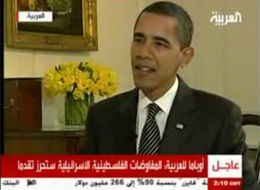
5:46 P.M. EST
Q Mr. President, thank you for this opportunity, we really
appreciate it.
THE PRESIDENT: Thank you so much.
Q Sir, you just met with your personal envoy to theMiddle
East, Senator Mitchell. Obviously, his first task is to consolidate the
cease-fire. But beyond that you've been saying that you want to pursue
actively and aggressively peacemaking between the Palestinians and the
Israelis. Tell us a little bit about how do you see your personal role,
because, you know, if the President of the United States is not involved,
nothing happens -- as the history of peacemaking shows. Will you be
proposing ideas, pitching proposals, parameters, as one of your predecessors
did? Or just urging the parties to come up with their own resolutions, as
your immediate predecessor did?
THE PRESIDENT: Well, I think the most important thing is for
the United States to get engaged right away. And George Mitchell is somebody
of enormous stature. He is one of the few people who have international
experience brokering peace deals
And so what I told him is start by listening, because all
too often the United States starts by dictating -- in the past on some of
these issues -- and we don't always know all the factors that are involved.
So let's listen. He's going to be speaking to all the major parties
involved. And he will then report back to me. From there we will formulate a
specific response.
Ultimately, we cannot tell either the Israelis or the
Palestinians what's best for them. They're going to have to make some
decisions. But I do believe that the moment is ripe for both sides to
realize that the path that they are on is one that is not going to result in
prosperity and security for their people. And that instead, it's time to
return to the negotiating table.
And it's going to be difficult, it's going to take time. I
don't want to prejudge many of these issues, and I want to make sure that
expectations are not raised so that we think that this is going to be
resolved in a few months. But if we start the steady progress on these
issues, I'm absolutely confident that the United States -- working in tandem
with the European Union, with Russia, with all the Arab states in the region
-- I'm absolutely certain that we can make significant progress.
Q You've been saying essentially that we should not look at
these issues -- like the Palestinian-Israeli track and separation from the
border region -- you've been talking about a kind of holistic approach to
the region. Are we expecting a different paradigm in the sense that in the
past one of the critiques -- at least from the Arab side, the Muslim side --
is that everything the Americans always tested with the Israelis, if it
works. Now there is an Arab peace plan, there is a regional aspect to it.
And you've indicated that. Would there be any shift, a paradigm shift?
THE PRESIDENT: Well, here's what I think is important. Look
at the proposal that was put forth by King Abdullah of Saudi Arabia --
Q Right.
THE PRESIDENT: I might not agree with every aspect of the
proposal, but it took great courage --
Q Absolutely.
THE PRESIDENT: -- to put forward something that is as
significant as that. I think that there are ideas across the region of how
we might pursue peace.
I do think that it is impossible for us to think only in
terms of the Palestinian-Israeli conflict and not think in terms of what's
happening with Syria or Iran or Lebanon or Afghanistan and Pakistan. These
things are interrelated. And what I've said, and I think Hillary Clinton has
expressed this in her confirmation, is that if we are looking at the region
as a whole and communicating a message to the Arab world and the Muslim
world, that we are ready to initiate a new partnership based on mutual
respect and mutual interest, then I think that we can make significant
progress.
Now, Israel is a strong ally of the United States. They will
not stop being a strong ally of the United States. And I will continue to
believe that Israel's security is paramount. But I also believe that there
are Israelis who recognize that it is important to achieve peace. They will
be willing to make sacrifices if the time is appropriate and if there is
serious partnership on the other side.
And so what we want to do is to listen, set aside some of
the preconceptions that have existed and have built up over the last several
years. And I think if we do that, then there's a possibility at least of
achieving some breakthroughs.
Q I want to ask you about the broader Muslim world, but let
me -- one final thing about the Palestinian-Israeli theater. There are many
Palestinians and Israelis who are very frustrated now with the current
conditions and they are losing hope, they are disillusioned, and they
believe that time is running out on the two-state solution because -- mainly
because of the settlement activities in Palestinian-occupied territories.
Will it still be possible to see a Palestinian state -- and you know the
contours of it -- within the first Obama administration?
THE PRESIDENT: I think it is possible for us to see a
Palestinian state -- I'm not going to put a time frame on it -- that is
contiguous, that allows freedom of movement for its people, that allows for
trade with other countries, that allows the creation of businesses and
commerce so that people have a better life.
And, look, I think anybody who has studied the region
recognizes that the situation for the ordinary Palestinian in many cases has
not improved. And the bottom line in all these talks and all these
conversations is, is a child in the Palestinian Territories going to be
better off? Do they have a future for themselves? And is the child in Israel
going to feel confident about his or her safety and security? And if we can
keep our focus on making their lives better and look forward, and not simply
think about all the conflicts and tragedies of the past, then I think that
we have an opportunity to make real progress.
But it is not going to be easy, and that's why we've got
George Mitchell going there. This is somebody with extraordinary patience as
well as extraordinary skill, and that's what's going to be necessary.
Q Absolutely. Let me take a broader look at the whole
region. You are planning to address the Muslim world in your first 100 days
from a Muslim capital. And everybody is speculating about the capital.
(Laughter.) If you have anything further, that would be great.
How concerned are you -- because, let me tell you, honestly,
when I see certain things about America -- in some parts, I don't want to
exaggerate -- there is a demonization of America.
THE PRESIDENT: Absolutely.
Q It's become like a new religion, and like a new religion
it has new converts -- like a new religion has its own high priests.
THE PRESIDENT: Right.
Q It's only a religious text.
THE PRESIDENT: Right.
Q And in the last -- since 9/11 and because of Iraq, that
alienation is wider between the Americans and -- and in generations past,
the United States was held high. It was the only Western power with no
colonial legacy.
THE PRESIDENT: Right.
Q How concerned are you and -- because people sense that you
have a different political discourse. And I think, judging by (inaudible)
and Zawahiri and Osama bin Laden and all these, you know -- a chorus --
THE PRESIDENT: Yes, I noticed this. They seem nervous.
Q They seem very nervous, exactly. Now, tell me why they
should be more nervous?
THE PRESIDENT: Well, I think that when you look at the
rhetoric that they've been using against me before I even took office --
Q I know, I know.
THE PRESIDENT: -- what that tells me is that their ideas are
bankrupt. There's no actions that they've taken that say a child in the
Muslim world is getting a better education because of them, or has better
health care because of them.
In my inauguration speech, I spoke about: You will be judged
on what you've built, not what you've destroyed. And what they've been doing
is destroying things. And over time, I think the Muslim world has recognized
that that path is leading no place, except more death and destruction.
Now, my job is to communicate the fact that the United
States has a stake in the well-being of the Muslim world, that the language
we use has to be a language of respect. I have Muslim members of my family.
I have lived in Muslim countries.
Q The largest one.
THE PRESIDENT: The largest one, Indonesia. And so what I
want to communicate is the fact that in all my travels throughout the Muslim
world, what I've come to understand is that regardless of your faith -- and
America is a country of Muslims, Jews, Christians, non-believers --
regardless of your faith, people all have certain common hopes and common
dreams.
And my job is to communicate to the American people that the
Muslim world is filled with extraordinary people who simply want to live
their lives and see their children live better lives. My job to the Muslim
world is to communicate that the Americans are not your enemy. We sometimes
make mistakes. We have not been perfect. But if you look at the track
record, as you say, America was not born as a colonial power, and that the
same respect and partnership that America had with the Muslim world as
recently as 20 or 30 years ago, there's no reason why we can't restore that.
And that I think is going to be an important task.
But ultimately, people are going to judge me not by my words
but by my actions and my administration's actions. And I think that what you
will see over the next several years is that I'm not going to agree with
everything that some Muslim leader may say, or what's on a television
station in the Arab world -- but I think that what you'll see is somebody
who is listening, who is respectful, and who is trying to promote the
interests not just of the United States, but also ordinary people who right
now are suffering from poverty and a lack of opportunity. I want to make
sure that I'm speaking to them, as well.
Q Tell me, time is running out, any decision on from where
you will be visiting the Muslim world?
THE PRESIDENT: Well, I'm not going to break the news right
here.
Q Afghanistan?
THE PRESIDENT: But maybe next time. But it is something that
is going to be important. I want people to recognize, though, that we are
going to be making a series of initiatives. Sending George Mitchell to the
Middle East is fulfilling my campaign promise that we're not going to wait
until the end of my administration to deal with Palestinian and Israeli
peace, we're going to start now. It may take a long time to do, but we're
going to do it now. We're going to follow through on our commitment for me
to address the Muslim world from a Muslim capital. We are going to follow
through on many of my commitments to do a more effective job of reaching
out, listening, as well as speaking to the Muslim world.
And you're going to see me following through with dealing
with a drawdown of troops in Iraq, so that Iraqis can start taking more
responsibility. And finally, I think you've already seen a commitment, in
terms of closing Guantanamo, and making clear that even as we are decisive
in going after terrorist organizations that would kill innocent civilians,
that we're going to do so on our terms, and we're going to do so respecting
the rule of law that I think makes America great.
Q President Bush framed the war on terror conceptually in a
way that was very broad, "war on terror," and used sometimes certain
terminology that the many people -- Islamic fascism. You've always framed it
in a different way, specifically against one group called al Qaeda and their
collaborators. And is this one way of --
THE PRESIDENT: I think that you're making a very important
point. And that is that the language we use matters. And what we need to
understand is, is that there are extremist organizations -- whether Muslim
or any other faith in the past -- that will use faith as a justification for
violence. We cannot paint with a broad brush a faith as a consequence of the
violence that is done in that faith's name.
And so you will I think see our administration be very clear
in distinguishing between organizations like al Qaeda -- that espouse
violence, espouse terror and act on it -- and people who may disagree with
my administration and certain actions, or may have a particular viewpoint in
terms of how their countries should develop. We can have legitimate
disagreements but still be respectful. I cannot respect terrorist
organizations that would kill innocent civilians and we will hunt them down.
But to the broader Muslim world what we are going to be
offering is a hand of friendship.
Q Can I end with a question on Iran and Iraq then quickly?
THE PRESIDENT: It's up to the team --
MR. GIBBS: You have 30 seconds. (Laughter.)
Q Will the United States ever live with a nuclear Iran? And
if not, how far are you going in the direction of preventing it?
THE PRESIDENT: You know, I said during the campaign that it
is very important for us to make sure that we are using all the tools of
U.S. power, including diplomacy, in our relationship with Iran.
Now, the Iranian people are a great people, and Persian
civilization is a great civilization. Iran has acted in ways that's not
conducive to peace and prosperity in the region: their threats against
Israel; their pursuit of a nuclear weapon which could potentially set off an
arms race in the region that would make everybody less safe; their support
of terrorist organizations in the past -- none of these things have been
helpful.
But I do think that it is important for us to be willing to
talk to Iran, to express very clearly where our differences are, but where
there are potential avenues for progress. And we will over the next several
months be laying out our general framework and approach. And as I said
during my inauguration speech, if countries like Iran are willing to
unclench their fist, they will find an extended hand from us.
Q Shall we leave Iraq next interview, or just --
MR. GIBBS: Yes, let's -- we're past, and I got to get him
back to dinner with his wife.
Q Sir, I really appreciate it.
THE PRESIDENT: Thank you so much.
Q Thanks a lot.
THE PRESIDENT: I appreciate it.
Q Thank you.
THE PRESIDENT: Thank you.
END 6:03 P.M. EST
07:52 | | 0 Comments
Sign up for Facebook to connect with Barack Obama
Detailed Info
Website: Gender: Relationship Status:
Michelle ObamaBirthday: Religious Views: Interests: Favorite Music:
Johann Sebastian Bach (cello suites), and The FugeesFavorite Movies:
One Flew Over the Cuckoo's NestFavorite Books:
Shakespeare's Tragedies, Parting the Waters, Gilead (Robinson), Self-Reliance (Emerson), The Bible, Lincoln's Collected WritingsFavorite TV Shows: Favorite Quotations:
towards justice." (MLK)Work Info
Education Info
Contact Info
Phone:
07:41 | | 0 Comments
Barack Obama
Barack" and "Obama" redirect here. For other uses, see Barack (disambiguation) and Obama (disambiguation).
Barack Obama
44th President of the United States
Incumbent
Assumed office January 20, 2009
Vice President
Joe Biden
Preceded by
George W. Bush
United States Senatorfrom Illinois
In officeJanuary 3, 2005 – November 16, 2008
Preceded by
Peter Fitzgerald
Succeeded by
Roland Burris
Member of the Illinois Senatefrom the 13th district
In officeJanuary 8, 1997 – November 4, 2004
Preceded by
Alice Palmer
Succeeded by
Kwame Raoul
Born
August 4, 1961 (1961-08-04) (age 47)[1]Honolulu, Hawaii, United States[2]
Birth name
Barack Hussein Obama II[2]
Nationality
American
Political party
Democratic
Spouse
Michelle Obama (m. 1992)
Children
Malia Ann (b. 1998)Natasha (a.k.a. Sasha) (b. 2001)
Residence
Chicago, Illinois (private)White House, Washington, D.C. (official)
Alma mater
Occidental CollegeColumbia University (B.A.)Harvard Law School (J.D.)
Profession
Community organizerAttorneyAuthorProfessorPolitician
Religion
Protestant Christian[3]
Signature
Website
WhiteHouse.gov
This article is part of a series about
Barack Obama
Background · Illinois Senate · U.S. SenatePolitical positions · Public image · Family2008 primaries · Obama–Biden campaignTransition · Inauguration · US Presidency
Barack Hussein Obama II (pronounced /bəˈrɑːk hʊˈseɪn oʊˈbɑːmə/; born August 4, 1961) is the 44th and current President of the United States. He is the first African American to hold the office. Obama was the junior United States Senator from Illinois from 2005 until he resigned following his 2008 election to the presidency. He was inaugurated as President on January 20, 2009.
Obama is a graduate of Columbia University and Harvard Law School, where he was the first African American president of the Harvard Law Review. He worked as a community organizer, and practiced as a civil rights attorney in Chicago before serving three terms in the Illinois Senate from 1997 to 2004. He also taught Constitutional Law at the University of Chicago Law School from 1992 to 2004. Following an unsuccessful bid for a seat in the U.S. House of Representatives in 2000, Obama was elected to the Senate in November 2004. Obama delivered the keynote address at the Democratic National Convention in July 2004.
As a member of the Democratic minority in the 109th Congress, Obama helped create legislation to control conventional weapons and to promote greater public accountability in the use of federal funds. He also made official trips to Eastern Europe, the Middle East, and Africa. During the 110th Congress, he helped create legislation regarding lobbying and electoral fraud, climate change, nuclear terrorism, and care for U.S. military personnel returning from combat assignments in Iraq and Afghanistan.
06:44 | | 0 Comments


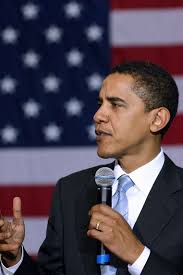
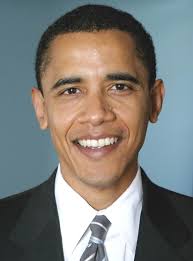
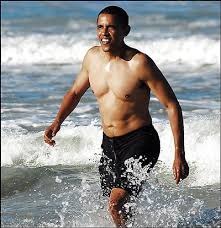
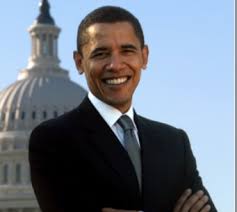

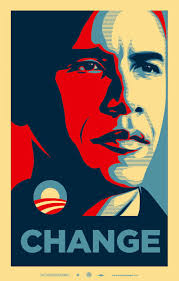


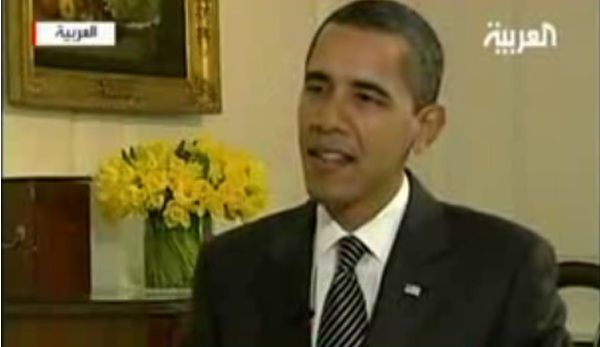

![[Obama '08]](mhtml:mid://00000075/!http://photos-e.ak.fbcdn.net/photos-ak-snc1/genericv2/1337/13/01AwcAX5WffSQAAAABAAAAAAAAAAA:.jpg)





